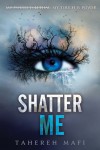midnight coffee monster
I am a fully-motivated and crazy reader of avid proportions. A book is always at the ready no matter where I am, usually a fantasy of some kind or contemporary. (Nie zu viele Bücher!)
Currently reading
Book Review: The Strange Case of Dr. Jekyll & Mr. Hyde by Robert Louis Stevenson

Behold: the regal and mystery that is The Strange Case of Dr. Jekyll & Mr. Hyde, if only I found it regaling and mysterious. A notable classic whose references still hold widely popular, the mystery has been stripped away—even for someone such as myself, who has never watched a film adaption. I am, however, familiar with the story and duality Jekyll and Hyde represent. Although far from a purely angelic being, Jekyll is neither good nor bad. What Dr. Jekyll equates to is an ambitious scientist who incidentally unleashes an evil from within himself. Now released, to be contained and muted beneath Jekyll’s morals and persona doesn’t appeal to the conscienceless Mr. Hyde. Confined in one body, a great struggle for dominance between two entities ensues, and what Jekyll might’ve hoped would be his success threatens his very life and reputation.
My devil had long been caged, he came out roaring.
This much I knew, as should everyone else. The puzzle piece is continually exploited and its references bomb pop culture. The mystery, then, is no longer a mystery. The shock value is nulled, but I didn’t read The Strange Case of Dr. Jekyll & Mr. Hyde to hitch a ride on supposed thrill. Of course I liked the idea of knocking out another classic from my to-read list, but I also sought horror and hoped to be a first-hand witness to Jekyll’s torment. What I read, unfortunately, does not match up to what I had hoped to read. Where is the fright? The anguish in Jekyll’s eyes? Hyde’s fear and pursuit for control?
I found that it’s impossible to observe any of this because Stevenson denies his readers access. Some may disagree with my statement, but we—the readers—find ourselves strapped to Mr. Utterson’s side, hearing the story mostly through his account. (And in past tense no less.) Trapped in an outsider’s perspective, I, too—like Mr. Utterson—become a third party to the events of Jekyll and Hyde. I cannot observe the one most intriguing aspect, and everything I looked forward to reading about was crushed by Robert Louis Stevenson. Or, depending on how you look at it, Hollywood excelled in raising the standards of my expectations.
Mr. Hyde, as it turns out, is not the monster I expected. Stevenson only provides rare glimpses of the man, which does nothing to indulge my fantasy of an incorrigible evil that stalks nighttime streets. More importantly: rather than the individual of Jekyll or Hyde, what gives this novella power is the interrelationship between the two forces. Hyde begins as a dormant entity that emerges as a ruthless tyrant, growing to completely replace Dr. Jekyll. I am left in a disappointed state, because I believe the split individual(s)—the doctor and his freed cruelty—deserves spotlight. Had Stevenson wrote The Strange Case of Dr. Jekyll & Mr. Hyde differently, the duality of human nature could have been more deeply explored.
This is not to say I don’t enjoy or appreciate the theme. I did, in fact, take pleasure in reading this despite frustrations. The idea that people contain an alter ego, or two opposite forces, skulking beneath the public display of themselves is an interesting thought to tamper with. Although I had obvious disappointment—almost an anticlimactic experience—this literary work is long-standing and continues to see success. It remains a classic, and I feel that its references in popular culture will outlive many of us, which I think is enough reason to read The Strange Case of Dr. Jekyll & Mr. Hyde at least once. I certainly don’t regret the short little while it took me to finish Stevenson’s story, and I’m quite glad I set aside the time.
This, as I take it, was because all human beings, as we meet them, are commingled out of good and evil: and Edward Hyde, alone in the ranks of mankind, was pure evil.
This review and more can be read at Midnight Coffee Monster.











